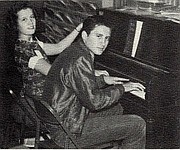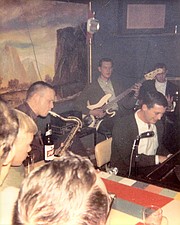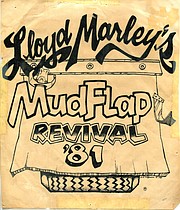Lloyd Marley hasn't been able to perform in the bars on Dickson Street for the better part of the past year, but visit him in his home and he may just lift a guitar and pick out one of his favorite songs for you.
"It's one my favorites, yes, but that's one of everybody else's favorites of mine," he says with a chuckle after a soft rendition of Red Headed Angel.
Marley wrote the tune in what now seems like a lifetime ago -- nearly 30 years. But his importance in the Northwest Arkansas music scene begins decades before he penned one of his most crowd-pleasing originals.
Pick nearly any name of the region's popular rockers during the 1960s, '70s and early '80s, and Marley's narrative likely intertwines with theirs in one way or another. He got his start performing in the area following his graduation in 1958 from Bentonville High School, where he was voted "Most Talented" among the graduating seniors.
"I became a piano player out of need. Everybody had a guitar player, and everybody needed a piano player," Marley recalls. But the catalyst for his passion for music was Chuck Berry's rock 'n' roll guitar.
"I thought he was the greatest, and we always tried to be like Chuck Berry. I didn't take up guitar 'til 20 years later. I still play guitar and piano, both. I always wanted to be a guitar player, but I didn't have a guitar; we didn't have any money when I was kid.
"So I was lucky to have work because I was a capable piano player," he continues. "I never was a great piano player; I'm mostly an accompanist, and I have a good voice."
Some of Marley's contemporaries might beg to differ on that point about not being great, though.
"He was intense, and he believed in what he did, and he was just real," Marley's friend and fellow musician Jerry Rogers says, thinking back on when the two first began performing together.
"My best memory of Lloyd was when he used to play at the Huddle Club," adds Fayetteville legend Earl Cate. "It would just be him on the piano and singing, and all these fraternity guys packed around the piano. They loved Lloyd."
Brushes with fame
The Huddle Club, The Rockwood Club, the VFW, the Y'all Come Back Saloon -- Marley played them all. Not to mention all the spots on Dickson Street, fraternity parties throughout the region and a birthday party at Don Tyson's lake house now and then.
He performed as a solo act and with various bands over the decades. The who's who of venerated Arkansas musicians Marley either played with, knew, or is separated from by one degree of band-member separation is too long for any one story. But consider the musical climate he was coming up in, and you'll get the picture.
"He was kind of in that first batch after Ronnie Hawkins -- that first batch of rock 'n' roll in Fayetteville," Cate offers. "Back then we had John Tolleson, Johnny Roberts, Bill Lafferty, The Emcees... There was a lot of tradition there for this town as far as having its own style. There's always been a lot happening musically, it seems like. [And Lloyd's influence] was huge. He was one of the favorites around here."
Cate and his twin brother, Ernie, met Marley when they were still teenagers living at home, Cate shares. Like many of the other groups in the area who had heard of his piano skills and needed a man at the keys, the Cates called Marley and asked him to come by and do an audition of sorts.
"He was a little bit late getting out there, so mom and dad had already gone the bed," Cate remembers. "So he comes in and sets up at this piano in the living room and starts playing the piano, and he was really sounding good!
"But I think mom and dad weren't that pleased," he finishes with a laugh.
Another phone call then audition -- this time at the Rockwood Club in south Fayetteville, not in a living room -- is how Marley landed with The Trebles for a brief period. This also happened to be around the time Ronnie Hawkins was preparing for a Canadian tour.
Marley's current group was worked into the conversation with Hawkins' booking agent, and Marley was off to the Great White North. Following that quick run through Canada, Marley also found himself at a two-week stint at New York's famed celebrity hangout the Peppermint Lounge.
"Well, we weren't good enough to really be a top-rate band, but Ronnie was a good help to us and tried to help us," Marley says. "So we came back and after that, we played all the fraternity parties on the university campus and in Oklahoma City and various places."
A comprehensive history of the rock groups of the time would reveal a cadre of personnel changes for many of them. Even after his turn with The Trebles, Marley's record is no different. There was a stretch where he took over the John Tolleson Band when its namesake left the group to work at the Baldwin Piano Company (before returning a few years later). Some time with John D. Levan and the Frisco Railroad is in there; Marley's own four-piece The Mudflaps; and a return trip to Canada where the group he was with "drank ourselves out of Canada, pretty much."
Following a liver failure scare and a few years of treatment for his alcohol addiction, Marley reunited with The Mudflaps and they played all over Dickson Street.
"We switched venues so many times -- we played country, we played rock 'n' roll, we played blues. At the time, you kind of had to play what was hip to play," Marley reveals.
"At one time, I recall the worst time for me in music, was when the Beatles came out. I had a band and we had an organ, a piano, a saxophone and a trumpet, and a bass and a guitar. We were playing Bobby Bland music -- big-band, blues music. And when the Beatles came out, everybody in the colleges said, 'We don't want this old music. We want to hear the Beatles.'
"Two or three of the bands in Fayetteville just immediately went over to playing the Beatles music. And that put me in the dark for awhile until the Beatles lost some of their [novelty]."
"Back in the day, we could make a living just right on Dickson Street; we didn't have to go anywhere," Rogers picks up the story. "We'd play one club and then go 20 feet into another club, and played four or five nights a week. I remember pushing my equipment down the sidewalk just to go to another club because it was too close to get in the car."
"I knew a lot of people in the music business and enjoyed company with them and sharing music with them," Marley reflects. "And most of all, I loved Dickson Street. And I loved playing it -- at The Swinging Door and Chester's and The Library and all those places down there. I enjoyed the camaraderie, I enjoyed the attention, and I also for many years enjoyed the drunkenness and the partying.
"But all of the Dickson Street people loved us and were good to musicians."
Success on Dickson
Other than during the height of Beatle Mania, Marley seemed to maintain a moderate level of success in the local circuit. Fayetteville native Eric Johnson -- who holds a PhD in American Studies and was formerly with the Pryor Center for Arkansas Oral and Visual History -- remembers Marley as part of the "old guard of Northwest Arkansas musicians."
"I know that he was always well respected in Northwest Arkansas by other musicians and that he helped pioneer the kind of rhythm and blues-influenced sound that really came to define the area from the late '60s to the '90s," Johnson shares.
"I'd say, think of Willie Nelson playing Jerry Lee Lewis piano," Rogers says of Marley's sound. The blues was Marley's first true love, though, and that also came through in his music.
"I never got instructions from him, but I could watch him and I learned how to sing blues, for a white man," Rogers goes on. "I'd always done 'Stormy Monday' and stuff like that, but he was doing the real stuff -- BB King, and like 'Put on your red dress baby, 'cause we're going out tonight,' you know? So I just watched. I learned how to do the inflections. I'd say I learned a bit."
"We had quite a bit of success on Dickson Street with the blues because there weren't that many people that were playing the traditional blues," Marley says. "Because I was old enough to remember Muddy Waters and all those guys that were very famous with us kids."
A few chances have come along through the years of a shot at gaining some recognition beyond the Natural State, but each time ended up being a disappointment, Marley admits. A rejection letter from Columbia Records; a local duo who had recorded one of his songs refusing to surrender the rights so he could offer it to an interested studio; the friend who was supposed to take a recording of one of Marley's songs to Nashville ending up in the hospital the night before his flight -- there were a lot of near-misses.
And one of those misses included Rogers, Cate and John D. Levan. At the top of the '90s, pioneer rockabilly guitarist Levan brought some of his musician friends together with a special guest, country music star Tommy Overstreet, to film the pilot of The John D. Levan Show. Marley, Cate and Rogers, along with a few other locals, were part of the house band -- Ozark Central Band -- and performed a few of Levan's songs, one of Rogers' and one of Marley's in the variety show format. Overstreet was featured with a couple songs and sat down with Levan for a brief interview.
"It was a pretty good production, and good for live, too. It was all one take," Rogers remembers proudly. "It was a lot of fun, and it was live, and it was real. No lip-syncing, no Milli Vanilli or nothing. It was just us."
Unfortunately, the show wasn't picked up, so clips from the recording would go on to circulate on Facebook for a time until they mostly disappeared after Overstreet's death, Marley says.
"He didn't have any ill feelings toward anybody," Rogers says of Marley's setbacks. "He knew about the business, more than I did. So that's all you can do is just play to be be playing."
"We kind of wore out our time, you know?" Marley muses. "Most musicians don't wind up playing as long as I got to. And once you're gone old hat, you're not booked very much.
"But we had a grand time. We not only played music, but we enjoyed our music. I've never seen anybody like Dickson Street people, the way they love their music and the bands love to play. It's a great joy for everybody. Just a great joy."
More Memories
“The performing was always fun,” Jerry Rogers remembers of his early days with Lloyd Marley. “But when we first got together, we would drive around, he had an old Camaro — one of the big boats, where the doors weigh like 200 pounds, that kind of deal. And it was a great car, but the floorboard was rotted out, so I had to put cardboard in the floorboard to keep my feet from dragging on the pavement. And then he had a little bitty dog, her name was Pearl after Janice Joplin. And we’d just ride around and think about song lyrics — me and that little dog and Lloyd and that big car.”
NAN Our Town on 09/12/2019






